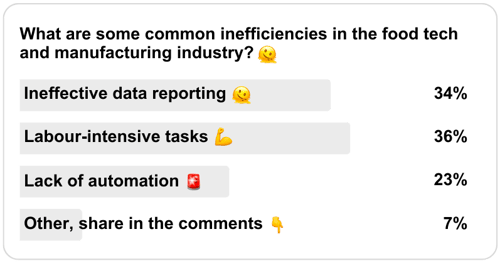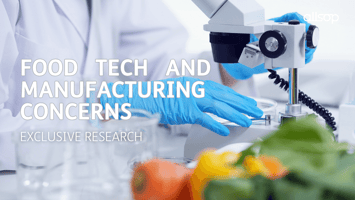The food tech and manufacturing industry is the heartbeat of our daily lives, buzzing with...
Common inefficiencies in businesses in 2023
Introduction
What are some common inefficiencies in the food tech and manufacturing industry?
The food tech and manufacturing industry is a highly competitive and rapidly growing sector that plays a crucial role in our daily lives. The industry is constantly evolving and adapting to meet the changing demands of consumers. However, there are many inefficiencies that plague the businesses that hinder their growth and development. In this article, we will take a closer look at three common inefficiencies in the food tech and manufacturing industry and explore potential solutions.
- Introduction
- Poll Results
- Experts Opinion.
- “Lack of Automation” by Supply Chain Director.
- “Ineffective Data Reporting” by QA & Food Safety Auditor.
- “Labour-Intensive Tasks” as noted by Customer Order Manager.
- Conclusion.
To better understand the topic, we asked over 280 industry professionals to weigh in on the question, "What are some common inefficiencies in the food tech and manufacturing industry?". We were blown away by the wealth of insightful responses we received within just two weeks!
Poll Results
What are some common inefficiencies in the food tech and manufacturing industry?

From ineffective data reporting to a lack of automation, the submissions covered many inefficiencies plaguing the industry.
💬 Route Sales Manager shared, “Too much duplication, Using nuts as an example. There must be 10-15 brands of nuts, not including private labels. Shelf space is finite.”
💸 Another CFO mentioned that “The contestant turn over in manual production tasks that have not been able to be automated and are often in temperature controlled environments.”
📌 Sales Specialist noted, “Will always be, in my opinion, lack of workers' attention.”
These responses vary depending on the department and the specific niche of the company, therefore we decided to delve deeper into the topic of common inefficiencies in the Food and Beverage industry.
Interview with Experts.
What are some common inefficiencies in the food tech and manufacturing industry?
To gain further insights into these results, we reached out to various experts in the industry to hear their opinions on the poll results and learn about the changes they would make to business processes to stay ahead of the curve. We believe that their insights and recommendations will provide valuable guidance for businesses looking to improve their operations and gain a competitive edge.
“Lack of Automation” by Supply Chain Director.
Interview with Experts.
One of the most common inefficiencies in the food tech and manufacturing industry is a lack of automation. Without automation, tasks such as inventory management and supply chain management can be time-consuming and prone to errors. This is exactly what Supply Chain Director has mentioned.
“I've noticed that companies I have worked for have been slow to adopt, or shown no interest at all, in Industry 4.0. There are too many CFOs who don't see the merit in harnessing the data at their fingertips. Sure, they'll pony up for Avalara or a better payment processing system, but they see the price tag of a modern ERP, TMS, or WMS and they shut down.
One of my pet peeves is hearing "We've always done it this way and it's good enough."
You've got two things going against you there.
- They already assume the ROI is going to take too long.
- Their data is usually in such a bad state that it's difficult to prove to them that there is value in such a transformation.
How can you not see the value in accurate costing, knowing where your inventory is at any given time, how efficient is your production or purchasing, and things like potential supply issues?
I could go on all day, but I think the main issue is a bias against the cost of streamlining your systems and a misunderstanding of harvesting the power of the cloud and AI. I think Microsoft's approach to only paying for the modules you need via Business Central is a good start. It doesn't seem as daunting of a task that way.”
“Ineffective Data Reporting” by QA & Food Safety Auditor.
Interview with Experts.
Another common inefficiency in the food tech and manufacturing industry is ineffective data reporting. This can occur for a variety of reasons, including a lack of standardisation or a lack of understanding of the importance of data. Without accurate data reporting, it can be difficult to make informed decisions and identify areas for improvement. QA & Food Safety Auditor noted just that.
“Well, I am working as a food quality assurance specialist and I had implemented FSMS systems in different industries. As we know, the fundamental of implementing any FSMS system is the documentation and most of the documents are supposed to fill by the food handlers. However, due to a lack of awareness, they are unable to fill the checklists while fulfilling their responsibility or just secure their job they are giving the wrong information which is quite challenging to cope up with.”
To address this issue, companies should invest in training programs to ensure that employees understand the importance of data reporting and are equipped with the skills to do so effectively. Additionally, implementing standardised reporting processes can help ensure that data is consistent and accurate across the organisation. By doing so, businesses can make data-driven decisions and optimise their operations to increase efficiency, reduce waste, and improve profitability.
“Labour-Intensive Tasks” as noted by Customer Order Manager.
Interview with Experts.
Finally, labour-intensive tasks are another common inefficiency in the food tech and manufacturing industry. Many tasks, such as manual production tasks, have not been able to be automated and require significant time and resources to complete. This can lead to increased costs and slower production times.
Our team of 3 dedicated individuals often find themselves exhausted from the tedious and repetitive work...
“Our company receives customer orders through various channels such as web, EDI, and email. Although it may appear that we have all the necessary processes in place, our team of 3 dedicated individuals often find themselves exhausted from the tedious and repetitive work of filling out complex order forms. This is a time-consuming process that takes a significant amount of effort and concentration to complete. Unfortunately, the nature of such work means that we frequently encounter data entry mistakes and inaccuracies, which can have a negative impact on our business operations.”
To address this issue, companies should consider investing in automation technology. While there may be an upfront cost, the long-term benefits of increased efficiency and reduced labour costs can outweigh the initial investment. Automation technology can help businesses to optimise their operations, increase production capacity, and improve product quality. By automating tasks such as order processing, businesses can reduce data inaccuracy and improve overall efficiency.
Want to learn how we improve these business inefficiencies by automating tedious processes and systemising all your business data? Book a quick coffee catch-up with Daria below!
Conclusion.
What are some common inefficiencies in the food tech and manufacturing industry?
In conclusion, the food tech and manufacturing industry is a highly competitive and dynamic sector that is constantly evolving to meet the changing needs of consumers. However, there are many inefficiencies that plague the industry that hinder its growth and development. By addressing common inefficiencies such as ineffective data reporting, labour-intensive tasks, and a lack of automation, businesses can optimise their operations, increase efficiency, and gain a competitive edge. Investing in training programs, automation technology, and standardised reporting processes can help ensure that the industry continues to grow and thrive in the years to come.

